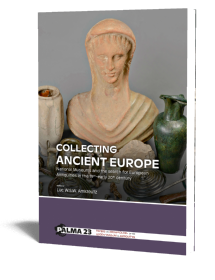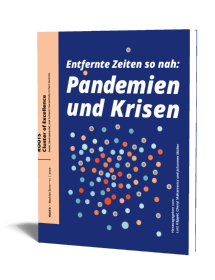Alles bleibt anders
Transformationsprozesse in Raum und Zeit
Edited by Wiebke Kirleis, Johannes Müller, Anna E. Reuter | 2024

Alles bleibt anders
Transformationsprozesse in Raum und Zeit
Edited by Wiebke Kirleis, Johannes Müller, Anna E. Reuter | 2024
Paperback ISBN: 9789464262698 | Imprint: Sidestone Press | Format: 170x210mm | 144 pp. | complementary magazine to the digital exhibition “Alles bleibt anders” | Series: Scales of Transformation | Language: German | 5 illus. (bw) | 184 illus. (fc) | Keywords: exhibition; transformation; archaeology; interdisciplinarity; human-environmental interaction; long-term perspective; socio-environmental interaction | download cover | DOI: 10.59641/ukz351nw
Read online or downloaded 389 times
-
Digital & Online access
This is a full Open Access publication, click below to buy in print, browse, or download for free.
-
Buy via Sidestone (EU & UK)
-
Buy via our Distributors (WORLD)
This title is not available via our UK or USA distributors. You can place an order above in the EU section. We can ship worldwide, shipping costs will be added during ordering based on destination.
-
Bookinfo
Paperback ISBN: 9789464262698 | Imprint: Sidestone Press | Format: 170x210mm | 144 pp. | complementary magazine to the digital exhibition “Alles bleibt anders” | Series: Scales of Transformation | Language: German | 5 illus. (bw) | 184 illus. (fc) | Keywords: exhibition; transformation; archaeology; interdisciplinarity; human-environmental interaction; long-term perspective; socio-environmental interaction | download cover | DOI: 10.59641/ukz351nw
Read online or downloaded 389 times

We will plant a tree for each order containing a paperback or hardback book via OneTreePlanted.org.
Keine Gesellschaft lebt ewig. Diese Tatsache mag erst einmal für Aufregung sorgen – dabei stellt dies den normalen Verlauf der Geschichte dar, denn Gesellschaften und ihre Umwelten verändern sich ständig. Transformationen bestimmen, wer wir sind, wie wir heute leben und wie wir uns weiterentwickeln.
Die Gründe für solche Transformationen – in der Gegenwart oder der Vergangenheit – sind zahlreich, divers und kompliziert, denn sie bewegen sich im hoch dynamischen „Mensch-Umwelt“-Spannungsverhältnis. Auslöser können z. B. Klima und Umwelt, Demographie und soziale Ungleichheit, mentale Welten, Bewegungen von Menschen, Tieren und Objekten sowie Ernährung sein. So vielfältig die Erscheinungsbilder von Transformationen sind, eines ist klar: Alles bleibt anders.
Dies ist das ergänzende Magazin zur digitalen Ausstellung. Die vollständige Ausstellung mit vielen weiteren Informationen, Exkursen und spannenden interaktiven Inhalten ist online zu finden unter allesbleibtanders.com.
English abstract
No society lives forever. Uncomfortable though it may be to consider, the rise and fall of societies is the ordinary course of history. Societies and their environments are subject to constant change. Transformations determine who we are, how we live today and how what our future development will look like.
The forces driving such transformations in the past as well as in the future are numerous, varied and complicated, operating as they do in the highly dynamic relationship created by interaction between human beings and their environment. Triggers include climate and environment, demography and social inequality mental worlds, the movement of people, animals and objects, or diet. Though transformations can appear under a variety of guises, one thing is certain: everything remains different.
This is the complementary magazine to the digital exhibition. The complete exhibition with lots more information, excursions and exciting interactive content can be found online at allesbleibtanders.com.
Eiszeitcamping – Familie an der Feuerstelle
Mara Julia-Weber
Kopflos – Leben und Sterben in Vráble
Sebastian Schultrich & Martin Furholt
Cities of Quartz – Untergang einer Megasiedlung
Robert Hoffmann
Dark Ages – Alle Menschen sind gleich?
Jan Piet Brozio
Die Pest – Eine Steinalte Pandemie?
Katharina Fuchs & Ben Krause-Kyora
Klimaflucht – Bei Sonnenschein
Julien Schirrmacher
Illumination – Feuerzauber am Grab
Jutta Kneisel
Rispenhirse – Superfood der Bronzezeit
Wiebke Kirleis
Sehstrahl – Das liegt im Auge des Betrachtenden
Julia Heil & Lutz Käppel
Nagaland – Nordostindien im Wandel
Maria Wunderlich

Prof. Dr. Wiebke Kirleis
Wiebke Kirleis is professor of environmental archaeology/archaeobotany at Kiel University, Germany. She is deputy director of the Collaborative Research Centre ‘Scales of Transformation: Human–Environmental Interaction in Prehistoric and Archaic Societies’ (CRC 1266, financed by the German Research Foundation/DFG) and a member of the Cluster of Excellence ‘Roots’ at Kiel University.
Anna E. Reuter
Anna E. Reuter is a public relations officer at the Collaborative Research Centre 1266 and a postdoctoral researcher in the field of archaeobotany at the Institute for Prehistoric and Protohistoric Archaeology, Kiel University (Germany). Her scientific research specialises in archaeobotany and focuses primarily on the Byzantine Empire, especially Southeast Europe and the Eastern Mediterranean region. Her scientific interests centre on the interaction between humans and their environment. Her focus is on the transformation of subsistence strategies against the background of the socio-economic situation of a society. The development and answering of socio-cultural and socio-economic questions as well as the development and application of innovative methods in local, regional and supra-regional contexts play a special role in her scientific research. She studied Prehistoric and Protohistoric Archaeology, Zoology and Botany and completed her PhD at Kiel University in 2018. Following her studies, she was a scholarship holder and research assistant at the LAIZA Mainz (formerly RGZM) and the CAU Kiel and was involved in various scientific projects.

Prof. dr. Johannes Müller
Johannes Müller (PhD, University of Freiburg, 1990) is a Professor and Director of the Institute for Prehistoric and Protohistoric Archaeology at Kiel University, Germany. He is the founding director of the Johanna Mestorf Academy, Speaker of the Collaborative Research Centre “Scales of Transformation: Human-environmental Interaction in Prehistoric and Archaic Societies”and of the Excellence Cluster “ROOTS – Social, Environmental, and Cultural Connectivity in Past Societies”.
Abstract:
Keine Gesellschaft lebt ewig. Diese Tatsache mag erst einmal für Aufregung sorgen – dabei stellt dies den normalen Verlauf der Geschichte dar, denn Gesellschaften und ihre Umwelten verändern sich ständig. Transformationen bestimmen, wer wir sind, wie wir heute leben und wie wir uns weiterentwickeln.
Die Gründe für solche Transformationen – in der Gegenwart oder der Vergangenheit – sind zahlreich, divers und kompliziert, denn sie bewegen sich im hoch dynamischen „Mensch-Umwelt“-Spannungsverhältnis. Auslöser können z. B. Klima und Umwelt, Demographie und soziale Ungleichheit, mentale Welten, Bewegungen von Menschen, Tieren und Objekten sowie Ernährung sein. So vielfältig die Erscheinungsbilder von Transformationen sind, eines ist klar: Alles bleibt anders.
Dies ist das ergänzende Magazin zur digitalen Ausstellung. Die vollständige Ausstellung mit vielen weiteren Informationen, Exkursen und spannenden interaktiven Inhalten ist online zu finden unter allesbleibtanders.com.
English abstract
No society lives forever. Uncomfortable though it may be to consider, the rise and fall of societies is the ordinary course of history. Societies and their environments are subject to constant change. Transformations determine who we are, how we live today and how what our future development will look like.
The forces driving such transformations in the past as well as in the future are numerous, varied and complicated, operating as they do in the highly dynamic relationship created by interaction between human beings and their environment. Triggers include climate and environment, demography and social inequality mental worlds, the movement of people, animals and objects, or diet. Though transformations can appear under a variety of guises, one thing is certain: everything remains different.
This is the complementary magazine to the digital exhibition. The complete exhibition with lots more information, excursions and exciting interactive content can be found online at allesbleibtanders.com.
Contents
Eiszeitcamping – Familie an der Feuerstelle
Mara Julia-Weber
Kopflos – Leben und Sterben in Vráble
Sebastian Schultrich & Martin Furholt
Cities of Quartz – Untergang einer Megasiedlung
Robert Hoffmann
Dark Ages – Alle Menschen sind gleich?
Jan Piet Brozio
Die Pest – Eine Steinalte Pandemie?
Katharina Fuchs & Ben Krause-Kyora
Klimaflucht – Bei Sonnenschein
Julien Schirrmacher
Illumination – Feuerzauber am Grab
Jutta Kneisel
Rispenhirse – Superfood der Bronzezeit
Wiebke Kirleis
Sehstrahl – Das liegt im Auge des Betrachtenden
Julia Heil & Lutz Käppel
Nagaland – Nordostindien im Wandel
Maria Wunderlich

Prof. Dr. Wiebke Kirleis
Wiebke Kirleis is professor of environmental archaeology/archaeobotany at Kiel University, Germany. She is deputy director of the Collaborative Research Centre ‘Scales of Transformation: Human–Environmental Interaction in Prehistoric and Archaic Societies’ (CRC 1266, financed by the German Research Foundation/DFG) and a member of the Cluster of Excellence ‘Roots’ at Kiel University.
Anna E. Reuter
Anna E. Reuter is a public relations officer at the Collaborative Research Centre 1266 and a postdoctoral researcher in the field of archaeobotany at the Institute for Prehistoric and Protohistoric Archaeology, Kiel University (Germany). Her scientific research specialises in archaeobotany and focuses primarily on the Byzantine Empire, especially Southeast Europe and the Eastern Mediterranean region. Her scientific interests centre on the interaction between humans and their environment. Her focus is on the transformation of subsistence strategies against the background of the socio-economic situation of a society. The development and answering of socio-cultural and socio-economic questions as well as the development and application of innovative methods in local, regional and supra-regional contexts play a special role in her scientific research. She studied Prehistoric and Protohistoric Archaeology, Zoology and Botany and completed her PhD at Kiel University in 2018. Following her studies, she was a scholarship holder and research assistant at the LAIZA Mainz (formerly RGZM) and the CAU Kiel and was involved in various scientific projects.

Prof. dr. Johannes Müller
Johannes Müller (PhD, University of Freiburg, 1990) is a Professor and Director of the Institute for Prehistoric and Protohistoric Archaeology at Kiel University, Germany. He is the founding director of the Johanna Mestorf Academy, Speaker of the Collaborative Research Centre “Scales of Transformation: Human-environmental Interaction in Prehistoric and Archaic Societies”and of the Excellence Cluster “ROOTS – Social, Environmental, and Cultural Connectivity in Past Societies”.
-
Digital & Online access
This is a full Open Access publication, click below to buy in print, browse, or download for free.
-
Buy via Sidestone (EU & UK)
-
Buy via our Distributors (WORLD)
This title is not available via our UK or USA distributors. You can place an order above in the EU section. We can ship worldwide, shipping costs will be added during ordering based on destination.
- Browse all books by subject
-
Search all books

We will plant a tree for each order containing a paperback or hardback book via OneTreePlanted.org.
You might also like:
© 2026 Sidestone Press KvK nr. 28114891 Privacy policy Sidestone Newsletter Terms and Conditions (Dutch)








